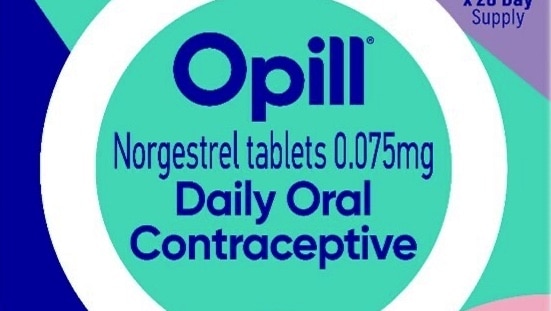The Future Of Family Planning: Exploring OTC Birth Control In A Post-Roe Landscape

Table of Contents
Increased Access and Convenience: The Promise of OTC Birth Control
The potential benefits of over-the-counter birth control are significant. Increased accessibility is paramount, especially for women in underserved communities, rural areas, or those facing financial barriers to healthcare. Currently, accessing prescription birth control often involves multiple steps: scheduling an appointment with a healthcare provider, undergoing potentially uncomfortable exams, and paying for both the visit and the medication. OTC birth control offers a pathway to circumvent these obstacles.
- Reduced reliance on doctor visits and appointments: Eliminating the need for a doctor's visit significantly reduces both time and financial constraints.
- Lower cost compared to prescription birth control: OTC options could be more affordable, particularly for individuals without insurance or with high co-pays.
- Increased privacy and autonomy: Purchasing birth control discreetly at a pharmacy empowers individuals to manage their reproductive health privately, without the need for third-party involvement.
- Wider availability in retail settings (pharmacies, drugstores): Increased availability means greater convenience and easier access for everyone.
- Potential for increased uptake of contraception leading to lower rates of unintended pregnancies: Simpler access could lead to a rise in contraceptive use, ultimately reducing rates of unintended pregnancies and abortions.
Addressing Concerns and Potential Challenges of OTC Birth Control
While the promise of increased access is compelling, concerns regarding OTC birth control must be addressed. The primary concern revolves around patient safety and responsible use.
- Ensuring accurate patient self-screening and appropriate medication selection: Clear and accessible information is crucial to help women understand which birth control method is right for them and to identify any potential contraindications.
- Addressing potential risks and side effects through comprehensive labeling and patient information resources: Detailed and easily understandable labeling, along with readily available online resources and pharmacist consultations, are vital to mitigate risks.
- Combating misinformation and promoting responsible use of contraceptives: Public health campaigns and educational initiatives are needed to counter misinformation and promote the safe and effective use of OTC birth control.
- Addressing concerns regarding potential interactions with other medications: Comprehensive patient education and pharmacist guidance will be crucial in minimizing the risk of dangerous drug interactions.
- The role of pharmacists in providing education and guidance: Pharmacists will play a critical role in providing pre-purchase consultations, answering questions, and offering guidance on appropriate medication choices.
The Role of Pharmacists and Healthcare Professionals
Pharmacists are uniquely positioned to play a vital role in the safe implementation of OTC birth control. Their expertise in medication management and patient counseling is essential.
- Pharmacists as essential sources of information and support: They can provide valuable information about different contraceptive methods, potential side effects, and contraindications.
- Providing pre-purchase consultations to assess suitability: A brief consultation could help ensure the patient selects the appropriate method and address any concerns.
- Dispensing appropriate contraceptives and addressing patient questions: Pharmacists can provide ongoing support and answer any questions the patient might have.
- Educating patients on proper usage, potential side effects, and contraindications: This comprehensive education is critical for safe and effective use.
The Impact of OTC Birth Control on Reproductive Health Outcomes
Increased access to OTC birth control has the potential to significantly improve reproductive health outcomes.
- Potential for reduced rates of unintended pregnancies and abortions: Greater access to contraception directly impacts the rate of unintended pregnancies.
- Improved access to family planning services for marginalized communities: This is particularly impactful for women in underserved areas or those facing financial hardships.
- Potential impact on maternal and child health outcomes: Reducing unintended pregnancies leads to improved maternal and child health outcomes.
- The role of readily available contraceptives in promoting sexual health: Easy access to contraception empowers individuals to make informed choices about their sexual health.
Legal and Regulatory Considerations for OTC Birth Control
The transition to OTC birth control requires careful consideration of legal and regulatory frameworks.
- FDA approval process for over-the-counter medications: A rigorous approval process is necessary to ensure the safety and efficacy of OTC birth control options.
- Policy implications for access to reproductive healthcare: Policies need to support increased access while addressing concerns about responsible use.
- Addressing potential legal challenges and obstacles to wider availability: Legal challenges may arise from various groups and require proactive solutions.
- State-level regulations and variations in access: State-level regulations could impact the availability of OTC birth control, creating disparities across the country.
Conclusion
The debate surrounding OTC birth control involves weighing the benefits of increased access and convenience against concerns about patient safety and responsible use. While challenges exist, the potential positive impact on reproductive health outcomes, particularly in a post-Roe landscape, is significant. Pharmacists and healthcare providers will play a critical role in ensuring safe and effective use through education and counseling. The future of family planning hinges on expanding access to affordable and convenient contraceptive options. Learn more about the ongoing efforts to increase access to OTC birth control and advocate for policies that support reproductive health and empower individuals to make informed choices about their reproductive lives. Stay informed about the latest developments in OTC birth control and its impact on the post-Roe landscape.

Featured Posts
-
 The China Problem Luxury Carmakers Face Headwinds
Apr 22, 2025
The China Problem Luxury Carmakers Face Headwinds
Apr 22, 2025 -
 Razer Blade 16 2025 High End Performance In A Slim Design A Review
Apr 22, 2025
Razer Blade 16 2025 High End Performance In A Slim Design A Review
Apr 22, 2025 -
 Access To Birth Control The Otc Revolution After Roe V Wade
Apr 22, 2025
Access To Birth Control The Otc Revolution After Roe V Wade
Apr 22, 2025 -
 Pope Franciss Impact A Defining Conclave
Apr 22, 2025
Pope Franciss Impact A Defining Conclave
Apr 22, 2025 -
 Pope Francis Dies At 88 Pneumonia Confirmed As Cause Of Death
Apr 22, 2025
Pope Francis Dies At 88 Pneumonia Confirmed As Cause Of Death
Apr 22, 2025
